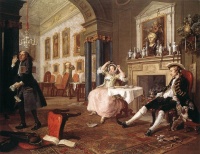Aristocracy
From The Art and Popular Culture Encyclopedia

|
"I have nothing, I owe a lot, the rest I give to the poor."--Testament of an aristocrat, often attributed to Rabelais |
|
Related e |
|
Featured: |
The term aristocracy refers to a form of government where power is hereditary, and split between a small number of families. It is derived from two Ancient Greek words, "aristos" meaning the "best" and "kratein" "to rule" and so aristocracy originally meant "rule by the best". Aristocracies have most often been hereditary plutocracies (see below), with a belief in their own superiority. Aristocracies often include a monarch who although a member of the aristocracy rules over the aristocracy as well as the rest of society. Aristocracy can also refer to the highest class in society even if they do not rule directly.
Europe
The French Revolution attacked aristocrats as people who had achieved their status by birth rather than by merit, and this was considered unjust. In the United Kingdom and other European countries, such as Spain and Denmark, in which hereditary titles are still recognised, "aristocrat" still refers to the descendant of one of approximately 7,000 families with hereditary titles, usually still in possession of considerable wealth, though not necessarily so.
Advocates of aristocracy
- Aristotle
- Anthony Ludovici
- Charles Baudelaire
- John Calvin
- G. K. Chesterton
- Julius Evola
- Guillaume Groen van Prinsterer
- Heraclitus
- Theodor Herzl
- D. H. Lawrence
- Joseph de Maistre
- Charles Maurras
- Arthur Moeller van den Bruck
- Friedrich Nietzsche
- José Ortega y Gasset
- Plato
- Oswald Spengler
- Alexis de Tocqueville
- Nicolás Gómez Dávila
- Hans-Hermann Hoppe
See also
- Gentry
- Honorifics
- Monarchy
- Nobility
- Abaza family
- Old Money
- Peerage (United Kingdom)
- Royal and noble ranks
- Styles (manner of address)
- Styles (royal and noble)
- Styles (United Kingdom)
- Titles
- Titles (false)
- Titles (hereditary)
- Titles (honorary)
- Social capital
- Social environment
- Symbolic capital
- Honour
- Moral responsibility

